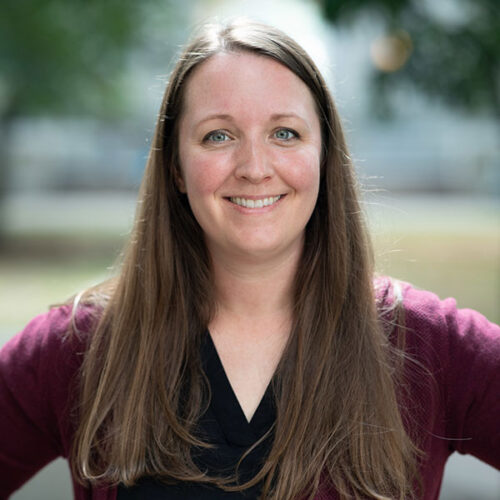Degrees
- B.S., University of Wisconsin – Madison (Economics, International Studies, and Latin American Studies)
- M.S., University of Minnesota – Twin Cities (Applied Economics)
- Ph.D., University of Minnesota – Twin Cities (Applied Economics)
Professor Krause is a development economist with particular interests in gender, health, education and poverty reduction strategies in developing countries. Her most recent research focuses on women’s empowerment, knowledge about child health, and risk attitudes in Guatemala. She spent five years working on project evaluating the impact of youth entrepreneurship training programs in East Africa. Her current research is studying food security and gender in Maasai households in Tanzania. She has been published in the journals Economía, Journal of Development Effectiveness, Reconsidering Development, and World Studies in Education. She has partnered with a number of international organizations, including the United Nations Economic Commission for Latin America, the International Food Policy Research Institute, the United States Agency for International Development, Oxford’s Poverty and Human Development Initiative, the Inter-American Development Bank, CARE International, and World Vision.
Areas of Interest
- Development Economics
- Global Health
- Economics of Education
- Food Security
- Poverty
- First Year Seminar on Global Health and Inequality
- Intermediate Macroeconomic Theory
- Principles of Economics
- Econometrics
- International Economic Development
- Economics of Global Health
- Health Economics
- DeMarchis, Dominic. 2024. “An Economic Assessment on the Relationship between Human Capital and GDP per Capita”
- Harmon, Trinity. 2024. “Gendered Labor Implications of Ecotourism: An Exploration into how the Rise of Ecotourism Affects Women’s Labor Force Participation in Latin America.”
- Saadi, Moody. 2024. “Exploring the Impact of Foreign Direct Investment on Economic Growth in Africa.”
- Silvanus, Rehann. 2024. “The Catalysts of Prosperity: An Exploration of the Impact of Financial Development on Economic Growth in Nepal.” Presented at the 2024 IPE Conference at the Eastern Economic Association.
- Tesfaye, Simon. 2024. “What is the Impact of Marital Status on Women’s Labor Force Participation in Ethiopia?”
- Walker, Liam. 2024. “The Enduring Connection: Redlining, Race, and the Ongoing Disparities in Breast Cancer Mortality Rates Among Black Women” Presented at the 2024 IPE Conference at the Eastern Economic Association.
- Minassie, Nebyou. 2022. “Explaining the Impact of Corruption in the Infrastructure Field.”
- Peterjohn, Laura. 2022. “Human Capital Investment through Education: The way to an equitable middle class in South Africa.” Presented at the 2022 IPE Conference at the Eastern Economic Association and the Cleveland Federal Reserve’s 2022 Economic Scholars Programand published in Issues in Political Economy, Vol 31(1), 2022, 135-184.
- Sharma, Mohini. 2022. “Between a Rock and a Hard Place: Decision-Making in the Face of NFIP Policy Changes.” Presented at the Cleveland Federal Reserve’s 2022 Economic Scholars Program.
- Sin, Ngwe. 2022. “Female Legislators and Growth: Why Having More Women in Policymaking Matters.” Presented at the Cleveland Federal Reserve’s 2022 Economic Scholars Program.
- Skornik-Hayes, Tabitha. 2022. “Violent Means for Secure Ends: How an Absence of State Social Safety Nets Impacts the Prevalence of Violent Political Activity.”
- McCarthy, Aine and Brooke Krause. (2024). “Age and Agency: Evidence from a Women’s Empowerment Program in Tanzania” World Development, Vol. 178, June 2024.
- Markovich Morris, Emily and Brooke Krause. (2024). “Multiplying and Mixing: Livelihood Strategies among Out-of-School Youth in Tanzania” In Hakeem Adeniyi Ajonbadi, Susan Sisay, Seun Oladele (Eds.), Exploring Entrepreneurship: Unpacking the Mosaic of Entrepreneurship across Africa. Springer Nature.
- Krause, Brooke. (2024). “Networks and Knowledge: Women’s Empowerment, Networks, and Health Information-Seeking Behavior in rural Guatemala” Journal of Rural Studies, Vol. 105.
- Lau, Rachel and Brooke Krause. (2021). “Preferences for Perceived Attractiveness in Modern Dance” Journal of Cultural Economics. 46:483-517. https://doi.org/10.1007/s10824-021-09424-5
- Krause, Brooke. (2019). “Risk Aversion and Diversification Strategies in Guatemala” Journal of International Development, Vol. 31, No. 7, 545-577.
- Lihwa, Flavian, Christopher J. Johnstone, Matthew A.M. Thomas and Brooke Krause. (2019). “Remoteness as a Gendered Construct.” Development in Practice, Vol. 29, No. 4, 1-13.
- Cuesta, Ana, Paul Glewwe, and Brooke Krause. (2016). “School Infrastructure and Educational Outcomes: A Literature Review, with Special Reference to Latin America.” Economía, Vol. 17, No. 1.
- Krause, Brooke, Aine Seitz McCarthy, and David Chapman. (2016). “Fueling financial literacy: Estimating the impact of youth entrepreneurship training in Tanzania.” Journal of Development Effectiveness, Vol. 8, No. 2.
- Lefebvre, Beth, Brooke Krause, and Amy Pekol. (2015). “I Would Like to Live a Better Life: How Young Mothers in East Africa Experience Entrepreneurship Education.” Reconsidering Development, Vol. 3, No. 1.
- Krause, Brooke, David Chapman, Joan DeJaeghere. (2013). “High Aspirations, Limited Capabilities, Challenging Context: An Empirical Look at a Youth Entrepreneurship Training Program in a Low-Income Setting.” World Studies in Education, Vol. 14, No. 2.
- USAID, Development Innovation Venture Grant (2022)
- College of Wooster Faculty/Staff Experiential Learning Award (2022)
- Supporting DEI Efforts in Economics, Ohio Five Collaborative Grant Program (2022)
- Hamburger Collective Research Project with Wooster Community Hospital (2020)
- Gender, Agriculture, and Assets Project (Phase 2), IFPRI, Gates Foundation, USAID (2015-2020)
- Community Enrichment Award, NAACP of Wooster / Orrville, OH (2019)
- International Livestock Research Institute (ILRI) Grant (2016)

